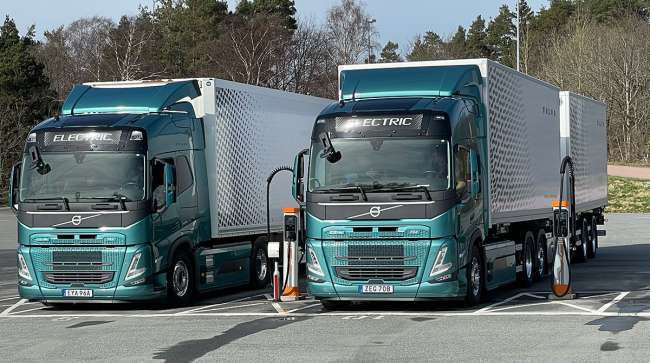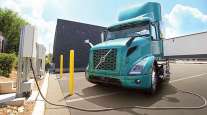Executive Editor
Volvo's Alm: Stakeholders Play a Role in Net-Zero Ambitions

[Stay on top of transportation news: Get TTNews in your inbox.]
GOTHENBURG, Sweden — Volvo Trucks President Roger Alm said the company’s goal of achieving 100% net-zero carbon emissions across its value chain by 2040 is one that must prove beneficial for all parties involved, and he stressed that conditions must align across many business fronts to make it happen.
“We need to create a win for everybody — we cannot just win by ourselves,” Alm said during an April 8 meeting with North American journalists at the World of Volvo city center. “We need to create a win for our customers. Our customers need to win by having us as a supplier. Our employees need to win by working for Volvo. Our owners need to win by investing in us. And society needs to win by everything we are doing.”
That includes a strategy focused on clean-energy vehicles, such as a growing slate of electric trucks that will soon stand at eight models as well as fuel cell electric and internal combustion engines powered by renewable fuels, Alm said.
“We are now making huge investments into this transformation,” he said.
He noted that Volvo Trucks currently has a rolling population of 1.2 million heavy-duty trucks on the road globally, and is focused on converting those trucks to net zero-emission by 2050, a customer-focused goal that stretches 10 years past its company-centric net-zero goal.
@VolvoTrucks President Roger Alm says shipper expectations will propel fleets to add zero-emissions vehicles. @TransportTopics is in Volvo’s hometown of Gothenburg this week for a three-day media event. pic.twitter.com/I9BvZiNhcr — Joe Howard (@JoeHoward_TT) April 9, 2024
“That is our responsibility, that is our commitment, because we have signed the Paris Agreement,” Alm said, citing the sweeping climate change agreement signed by 196 parties in 2015. “We need to turn them around to zero-emission vehicles.”
He acknowledged that it’s a sweeping challenge but also noted that Volvo has the business network to propel the transition.
“We are operating in approximately 150 countries around the world where we have an active business,” Alm said. “We have our own subsidiaries in 45 countries, and we have a service network of 2,300 locations spread all over the world. That is the density of the service network that we have built.”
@VolvoTrucks showcased a version of its FH16 Aero hauling 18- and 16.5-meter trailers at its Truck Experience Center in Gothenburg, Sweden to demonstrate the longer-length combinations possible around Europe. pic.twitter.com/wk7B8eibAG — Joe Howard (@JoeHoward_TT) April 8, 2024
Volvo manufactures trucks in 10 countries.
Beyond that, Alm said that Volvo has a wide range of stakeholders it is counting on to help.
“We have also created 640 business partners — that is dealers, that is service partners that is running them — that produce on behalf of us. They have contracted and they need to make sure they are fulfilling their requirements for the Volvo brand.”
The investments the company has made in connected vehicles also is part of the mix.
“We have close to 1 million heavy-duty trucks connected, where we can measure the performance, the utilization, the battery capacity and use the digital tools that we have to develop products,” he said.
This level of granularity is important given that transportation creates 14% of global CO2 emissions, with road transport alone responsible for 7% of that total, Alm noted.
“Here, we can make a difference, and we will make a difference,” he said.
Alm also stressed that this drive for cleaner trucks is not new; the company debuted its first battery-electric truck in 2019 and has been building the lineup ever since. Volvo currently has six BEVs in serial production, and that number will grow to eight in the 21st week of the year.
Do the Math
Electric Volvo trucks already on the road have covered more than 21 million miles, or about 900 laps around the world.
Source: Volvo Trucks CEO Roger Alm
“That has made a significant reduction in our CO2,” he said, “but what we are doing more is taking down the CO2 from our factories, from our dealerships, and doing a lot of other things, as well. It’s not only about the product and the trucks.”
The role shippers play is also vital, Alm said.
“The transport buyer, like Walmart, Pepsi or Coke, or whatever big companies, they will make this happen, because they will commit themselves to reducing their CO2 by science-based targets or something else. “From a cultural point of view, from a global economy point of view, or whatever. They will put pressure on the transporter that they need to move to zero-emissions products, because otherwise these companies will have a reduction in their business.”
Alm observed Volvo already is talking with shippers about their plans and expectations.
“We are doing a lot of talks with the transport buyers and gaining more and more insight from a transport buyer’s point of view,” he said. “Then we are talking with the transporters and the transport buyers and creating a triangular discussion [about] this ecosystem that we need to get moving.”
Want more news? Listen to today's daily briefing below or go here for more info:




